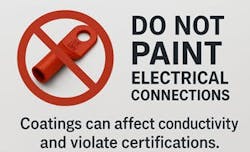Essential Guidelines for Painting or Coating Electrical Connections
Key Takeaways
- Avoid applying paints, lubricants, or patching compounds to electrical connections unless explicitly approved by the manufacturer.
- Unapproved coatings can create unintended conductive paths, insulate connections, and invalidate product certifications.
- Always follow manufacturer instructions and verify product certifications before applying any coatings to electrical components.
Proper torque and compression are critical for safe and effective electrical connections. Interference or modifications to the connections — especially from paint, lubricants, or other coatings — can compromise conductivity, increase impedance of the connection, and/or create unwanted conductive paths, and violate product certification standards.
What NOT to do
Do not apply any of the following substances to electrical connections or terminations unless explicitly approved by the equipment manufacturer:
- Liquid or spray paints (i.e., enamel, epoxy, varnish, insulating compounds)
- Lubricating sprays or substances (oils, grease, silicone-based compounds, etc.)
- PVC spray or patching compounds
- Pipe dope, putty, or tape on threaded metal conduit or gland connectors
These materials can:
- Create faults by creating unintended conductive paths.
- Insulate connections, reducing or preventing electrical current.
- Invalidate product certifications, leading to product and code compliance issues.
- This guidance applies to all electrical connections, including:
- Mechanical terminals and bolted connections
- Irreversible compression lugs
- Threaded conduit and fittings
- Cable glands and threaded enclosures
- Grounding/earthing connections
Exceptions to this rule
There are situations where you can use coatings.
- Exothermic welds — Finished exothermic welds are not typically susceptible to liquid or spray paint ingress; however, caution should be used due to possible deleterious effects of unapproved, untested paint on the weld.
- Metal conduit threads — Section 300.6(A) of the 2023 NEC permits approved conductive, metal-to-metal anti-corrosion compounds such as Thomas and Betts KOPR-SHIELD® and Eaton Crouse-Hinds STL8 and HTL4 conductive thread lubricants.
- Zinc-rich conductive coatings (often referred to erroneously as “cold galvanizing”) may be permitted where identified and approved for the purpose.
For more information on zinc-rich coatings, see the American Galvanizers Association website (https://galvanizeit.org/corrosion/corrosion-protection/zinc-coatings/zinc-rich-paint).
Best practices
Don’t forget to follow these recommendations when it comes to painting or coating electrical connections.
- Always follow manufacturer instructions and product certifications.
- Never assume a coating is safe for electrical use — verify before applying.
- Treat grounding connections with the same caution as ungrounded or intentionally grounded phase conductors.
- Consult the product manufacturer if unsure.
Final reminder
Only equipment manufacturers can specify or approve coatings on electrical terminations. Unapproved applications by the manufacturer can lead to equipment failure, safety hazards, and regulatory violations.
About the Author
Eddie Guidry
Senior Fellow
Eddie Guidry is a senior fellow with Fluor Enterprises, Inc., Sugar Land, Texas. He is highly skilled in electrical and control systems for industrial construction, design, and engineering (both domestic and abroad). The majority of Eddie’s 38 years of experience includes upstream and downstream portions of petrochemical plants and refineries. He is also heavily experienced in water and wastewater treatment facilities. Eddie is very active in the development of U.S. national (ANSI) and international codes and standards, and has been a principal member of the National Fire Protection Association (NFPA) National Electrical Code (NEC) committee since 1999 and NFPA’s National Advisory Committee on Electrical Safety Research since 2008. Eddie, who has also developed and conducted many electrical courses and seminars over the years, currently holds the corporate Master Electrician license for Fluor Corporation in the State of Texas and is also an ICC/IAEI certified electrical inspector.

